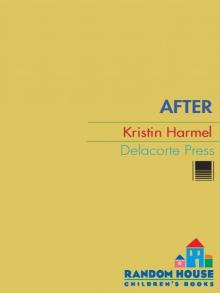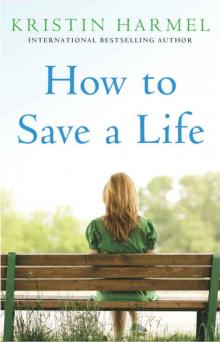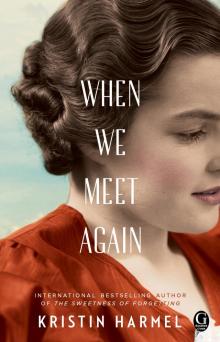- Home
- Kristin Harmel
The Winemaker's Wife Page 28
The Winemaker's Wife Read online
Page 28
Inès knew that Monsieur Godard would take the lie and spread it all over Champagne. And that meant that David—whose mother’s Jewish blood could otherwise put him in danger someday—might be able to safely disappear. Surely Edith and Edouard, with all their connections with the underground, could come up with a cover story to explain his arrival in Reims. “Yes. It is quite a tragedy.”
“Well, then, I will leave you to it,” Monsieur Godard said, bowing slightly, obsequiously, as he began to back away. “I trust I will see you tomorrow at the Brasserie Moulin, then.”
“Yes,” Inès said, though she had no intention of seeing the smarmy lawyer until she had figured out a way to redeem herself. “See you then.”
• • •
Inès brought two bags back to Edith’s apartment—one full of her own belongings, one full of the baby clothes Céline had been sewing from repurposed garments for months, in anticipation of her baby’s arrival.
She held David all afternoon, cooing to him, feeding him, trying to memorize his features. She could see Michel in him, as plain as day, and she could see Céline, too, in the fullness of his cheeks, the curve of his jaw. “I promise you,” she told him as she rocked him gently, “I will do everything I can to make sure your life is a good one.”
At the Brasserie Moulin, Edouard read over the lawyer’s paperwork and suggested a few small changes to the proposed fee structure, but Inès waved his concerns away. “I only care that he keeps the Maison Chauveau alive,” Inès said. “It will belong to David one day.”
Edouard frowned. “But how will you accomplish that with no proof that he is Michel’s son?”
“Because I own the Maison Chauveau now, and I can do with it what I wish,” Inès said.
By candlelight, long after the others had gone to sleep, Inès carefully printed out a note willing the Maison Chauveau to Edith should anything happen to her. She knew that if she didn’t return, Edith would find a way to make sure that David was legally her own, which would make him Edith’s heir. Inès signed the note, leaving it for Edith, along with another more hastily scrawled message begging Edith to care for David while Inès was gone.
He is better off with you You are good and kind, and I am not. I must make amends for what I have done, or I will never be the person I need to be. I understand now that fighting for France, fighting for goodness, is the only way I will find redemption. It is what Michel was trying to do, and I must carry on his work. If I do not return, and worse, if Céline does not survive, please do everything you can to ensure that David has a good life, and that he inherits the Maison Chauveau, which was never truly mine to give.
After signing that note, too, Inès left it on the desktop and returned to the parlor, where David slept peacefully, nestled in a pile of blankets on the floor. Inès watched his tiny eyelids flutter with the ghost of a dream, his little limbs twitching. Finally, after a very long time, she stood and slipped from the apartment, silent as a mouse, and disappeared into the dark night.
thirty-one
MAY 1945
CÉLINE
Céline was one of the lucky ones, they said, though that word—lucky, chanceux—tasted false and ugly on her tongue, so much so that she could not bring herself to say it aloud, even when the nurses hovered over her, tended to her wounds, pinched her hollow cheeks, and called her survival a miracle.
But what if she was, in fact, one of the fortunate? What if she could return to the Maison Chauveau and find Michel there waiting for her, their David now a chubby-cheeked toddler running circles in the vineyards, his laughter floating like bubbles into the sky. It was that thought that sustained her through all the dark, terrible nights in Auschwitz, that place of ghosts and nightmares. In the nearly two years before the camp’s liberation, she’d withered to thirty-five kilos, less than eighty pounds, skin stretched over bone. But she had survived because she had to. She had to come back to the love of her life, if there was even a chance he’d be there. She had to come back for their son.
She knew in the depths of her heart that Michel was probably dead. She had seen the Germans haul him away, had understood the price he would pay for his involvement in Richter’s death. The fact that Richter was about to violate Céline, well, that would not mitigate Michel’s fate, even if the Gestapo believed him. For two years now, she had made peace with the idea that he was gone, though the grief hadn’t ebbed.
But David. There was a chance, wasn’t there? Surely Inès had understood the stakes when she took him from Céline’s aching arms. Had Inès understood that her penance for what she had done was to keep David safe? Céline had clung for two years to the belief that the answer had to be yes, that David was happy, healthy, alive.
But now, as she approached the Maison Chauveau on foot, after taking the train from Paris to Reims and hitching a ride with an American convoy into Ville-Dommange, doubt swept in, nearly paralyzing her. For up ahead, the sign that had once sat outside the property, announcing the Maison Chauveau to visitors, was gone, and beyond it, the caretaker’s cottage, where Céline had lived a lifetime ago, was boarded up. She dropped her satchel—which contained only a bar of soap and a secondhand dress given to her by a sympathetic Red Cross worker—and ran the rest of the way to the main house, though her spindly legs—her muscles long since atrophied—shook and threatened to give out.
As she pounded on the door, her dread mounted. The rows of vines that Michel had once tended were withered, dead, black against the blue sky. The only sign that anyone had been there at all was a pair of tire tracks leading toward the barn on the back side of the property, the one where they’d once stored corks and empty bottles. When no one answered at the main house, Céline bit back her sob and ran toward the barn, flinging the doors open.
Inside, there was a black car she didn’t recognize, as well as several barrels lying on their sides, clearly in various stages of being cleaned. Her heart leapt. There was someone here, seeing to the champagne production, even if the place appeared to have fallen into ruin. “Michel?” she cried, choking on the word. “Inès? Theo?”
But the man who finally emerged from a trapdoor in the floor—a new entrance to the cellars?—was a stranger. He was tall, thin, perhaps sixty years old, with a gray mustache and a thin nose. “Mademoiselle?” he ventured, blinking at Céline, who must have appeared to him to be hardly more than a child. Indeed, her hips had vanished, her breasts flattened into nothing; she was a stick with arms and legs, a spindly, withered vine.
“Who are you?” she asked, her voice hoarse with fear. “Where are Michel? Theo? Inès?”
He frowned, and there was compassion in his eyes as he said, “They are gone.”
“Dead?”
“Who are you?” the man asked, his tone gentle.
“My name is Céline Laurent. My—my husband, Theo, was the winemaker here.”
He stared at her. “Céline Laurent? But I thought you had died.” He stepped forward and touched her arm awkwardly, as if he thought she might break from more contact than that. “I’m so sorry. Madame Laurent, my name is Alphonse Berthelot. I was hired as the winemaker here in 1943, but as you can see, I am working alone and am spread very thin. I’ve done my best to keep production going.”
“Where is everyone?” she whispered.
“Your husband left before I arrived,” he said. “The rumor is that he went south.”
Of course Theo had fled. She had driven him away. She hoped he had survived, but in the end, it didn’t matter, did it? She had barely thought of him at all in the past two years. “And Michel? Michel Chauveau?”
“You don’t know?” Monsieur Berthelot frowned. “Madame, I’m very sorry to tell you that the Germans killed him, all the way back in the spring of 1943.”
Céline’s knees gave out, and she crumpled to the ground. She had known this was almost certainly the case, but having Michel’s fate confirmed still shattered her. She was hardly aware of it when Monsieur Berthelot rushed to her side and tried to help he
r up, but it was useless. She was a rag doll. “You are certain?”
“I’m afraid so, madame.”
“And the baby?” she whispered. “Where is the baby? David?”
For a second, the man looked confused. “Oh dear, I’d forgotten. Monsieur Godard, the attorney who hired me to oversee this place, said you gave birth just before you were taken.”
From the deep well of pity in his eyes, she already knew the answer, but she had to hear him say the words. “Where is he? Where’s my son?”
“Madame, I’m so very sorry. Monsieur Godard told me what happened. Your baby, he—he didn’t survive.”
“No,” Céline whispered. “No, you must be wrong. I would have felt it if he had died.” But the truth was, she could no longer feel anything. Survival at Auschwitz had depended on her ability to fool herself, to cling to hope, to live in her dreams rather than in the real world. She couldn’t trust her own gut anymore, because her insides had been hollowed out long ago.
She wasn’t aware that she had curled herself into a ball on the floor until the man vanished and returned sometime later with an old woman, a woman Céline didn’t recognize at first. But then the woman said her name and helped her to a sitting position, and she realized that it was Madame Foucault, the white-haired midwife from the vineyard down the hill who had delivered David more than two years earlier.
“He’s gone?” Céline whispered as Madame Foucault stroked her hair. “My David is gone?”
“You poor dear,” the old woman murmured. “It will be all right.”
“No, no it will not.” Céline took a deep breath. “What happened to him?”
Madame Foucault hesitated. “I heard that it was his lungs, my dear. He was simply too early.”
Céline began to cry again. The fault was hers, wasn’t it? If she had only been able to keep him within her womb for more time, maybe he could have survived. But then again, if she hadn’t borne him early, he would only have died in Auschwitz. He had been doomed, either way. “And Inès?” Céline asked. “Where is Inès?”
“Dead, too, I’m afraid.”
“What? How?”
Madame Foucault’s mouth stretched into a thin line of disapproval. “I heard she joined the underground, just like her husband. Foolish girl. She was in a safe house the Germans raided last July, just outside Reims.”
“Inès? Are you sure?”
“It was the talk of the town, especially after what had happened to Monsieur Chauveau.”
“I can’t believe it.” Now, when the sobs came again, they were for Inès, too, for another young life lost too soon. None of them deserved what had come their way.
Céline’s father and grandparents were long dead—she knew now that they had been gassed upon arrival at Auschwitz in 1942—and any future she had dared dream of had been snatched from her trembling fingers. She looked down at her spindly arms, at the numbers inked just above her left wrist, numbers that were meant to take away her humanity, her name.
But without Michel and without David, she had no identity anyhow. How could she ever return to being Céline Laurent, the wife of a cold winemaker, the lover of a warm man who had never really been hers, the mother of a child whose death she had failed to prevent?
So she wiped away her tears, and with Madame Foucault’s support, she struggled to her feet. She turned to Monsieur Berthelot, whose eyes were wet. Her story had moved him, and she knew he would help her. “I’m very sorry, monsieur, but would it be possible for you to drive me to Paris?”
“To Paris? Well, yes, of course, madame.” He dashed off to get his keys.
“What will you do in Paris?” Madame Foucault asked.
Céline gazed out the barn door, where a sliver of the vineyards, of the rolling hills, of the magic of Champagne, was just visible. She wanted to remember this place, to fix it in her mind. “In Paris,” she murmured, “I will disappear.”
Life was no longer worth living as Céline Laurent. That woman—the woman who fell in love, the woman who still didn’t regret it, the woman who had fallen asleep one night in her lover’s arms and awoken to lose everything—didn’t exist anymore.
If David was gone, then the last pieces of herself, the ones she had clung to in Auschwitz, had disappeared forever, too. And so she climbed into the passenger seat of the new winemaker’s car and closed her eyes. When they arrived in Paris, and Monsieur Berthelot insisted on pressing some francs into her hand, she thanked him and said goodbye.
But the farewell wasn’t for him, not really. It was for the life that would be forever behind her the moment he drove away. She would go as far from Reims as she could. She would blend in with all the other refugees returning from the grave. She would become someone new and hope that somewhere, there was a life ahead of her after all.
thirty-two
MAY 1945
INÈS
By the time the war in Europe ended, with the unconditional surrender of the Third Reich’s armed forces signed right in the center of Reims on May 7, 1945, everything had long since changed for Inès.
After she had left Edith’s apartment in 1943, she had gone first to Paris, but no one knew her there, and it was difficult to find her way into any sort of underground network. Desperate to help, she made her way south, finally arriving in the Auvergne, where she found a group of maquisards willing to let her join them in the Forest of Tronçais. She learned to shoot and became good at planting explosives under railway tracks to disrupt German transports. She thought sometimes that Michel might have been proud of her.
Inès was a dedicated, selfless soldier, and in return, she asked only one thing of the group’s leader, a man named Tardivat, whom she’d grown to both respect and fear. “There is a man named Antoine Picard in Reims,” she said as the war in France wound down in the summer of 1944. “I’m to blame for my husband’s death, but Michel’s blood is on Picard’s hands, too. I want him to pay.”
Tardivat had smiled wearily. “Consider it done. And try to forgive yourself, would you, Inès? We’ve all done things we regret.”
Inès had looked away. “I don’t deserve forgiveness, sir.” The only way she would ever be able to live with herself was if she managed to reunite Céline with her son one day. It was a hope she had clung to over the long and painful months with the Maquis.
In the fall of 1944, two months after the liberation of Reims, Inès returned to Champagne and went straight to the Brasserie Moulin. But it was under new management, and all that the waiter at the front would tell her was that Edouard Thierry was still living in the apartment above the restaurant, rarely venturing out. “What about Edith?” Inès asked, bile rising in her throat. “What about the baby?” The man had only shaken his head and pointed upstairs.
Inès took the stairs two at a time and knocked on the door to the apartment, then pounded when no one came. She barely recognized the man who finally answered. Edouard had lost at least twenty pounds, his body concave now, and he had aged a decade since she’d last seen him a year and a half earlier. His hair had gone almost fully gray, his stubble white, and there were dark shadows under his eyes. “You’re alive?” he rasped.
“Where is Edith?” Inès asked, grasping his hands. He seemed to rock with the weight of her touch. “Where’s David?”
From within the apartment, she heard crying, the sound of a child, and Edouard looked over his shoulder and then back at Inès.
Inès pushed past him and found a toddler, two years old now, standing up in a rickety crib, reaching out his chubby arms. He stopped crying when he saw her, and they stared at each other. In the time she’d been away, he had grown to look even more like his father. He had Michel’s light hair now, his narrow nose, his crystal-blue eyes. But the shape of his face, the pitch of his chin, were all Céline. Inès bit back a sob and went to him. “Sweet David,” she murmured, and as she lifted him up and held him to her, he babbled into her shoulder and buried his small fingers in her wild hair. “Oh, thank God.”
; “You will take him, yes?” Edouard spoke from the doorway, and Inès turned to find him watching her. “I cannot do this anymore.”
“But where is Edith?”
“She’s dead, Inès.”
From the expression on Edouard’s face, the shadows under his eyes, and the way he had avoided the question earlier, she had suspected as much. But hearing him say the words aloud still made her nearly double over with pain. She began to cry, and David frowned and reached out to touch the tears rolling down her cheeks. “How? What happened, Edouard?”
Edouard blinked a few times, his eyes wet, too. “It was just before the liberation. The Germans were going wild. They knew it was over. They came upon a meeting of résistants, and instead of arresting them, they broke down the door and just began firing.”
Inès covered her face with her hands. “My God, Edouard. She was shot?”
“In the head,” Edouard said, his voice flat as he touched the spot just above his brow. “She was unrecognizable. So when I was asked to identify her, I did not. I told the authorities she was you.”
Inès froze. “What?”
“I thought you were dead already, Inès. We all did. You see, if the Germans had confirmed that they’d killed Edith Thierry, they would likely have arrested me, or worse, come to kill me. And then who would have looked after David?”
“But how did you explain Edith’s absence, then?”
He shook his head. “Oh, I think everyone knew, including the Germans who used to frequent our brasserie. But it was all over by then anyhow, and in the chaos of the liberation, no one came looking. What mattered was that on paper, you, Inès, were the résistante, and Edith had simply vanished. You know the Germans and their adherence to their paperwork.”
“Edouard, I’m so sorry,” Inès said. “Maybe if I’d stayed . . .”
“It would not have mattered. Edith and I accepted our fate when we agreed to work with the Allies. And since Edith cared so much about protecting David, it was a responsibility I took seriously, too. As you can see, he is well fed, healthy.” He nodded at the boy, who was watching him with round eyes. Edouard’s tone was still strangely flat. “But I have nothing, Inès, nothing to give anymore. Edith was my world, and now she is gone. I cannot care for the boy any longer.”

 The Room on Rue Amélie
The Room on Rue Amélie The Winemaker's Wife
The Winemaker's Wife The Forest of Vanishing Stars
The Forest of Vanishing Stars The Book of Lost Names
The Book of Lost Names Italian for Beginners
Italian for Beginners After
After How to Save a Life
How to Save a Life The Blonde Theory
The Blonde Theory The Sweetness of Forgetting
The Sweetness of Forgetting When We Meet Again
When We Meet Again Life Intended (9781476754178)
Life Intended (9781476754178)